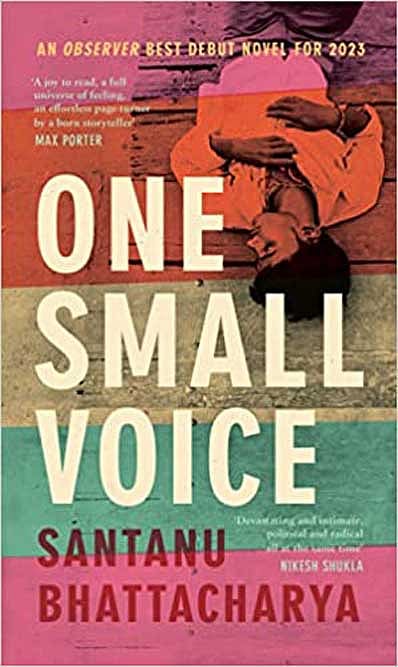Ghost of the Past

One Small Voice—the coming-of-age story of a millennial haunted by his boyhood memory of seeing a Muslim man burn alive in a riot—is a success. The book is far better than its first impression from a very lofty opening: ‘Give me permission,’ the first page says, ‘to tell the story of [...] a billion […] people,’ which raises some suspicion. Are we to hear another allegorical tale of a messy democracy the West loves to hear, where Indian individuality is sunk into the indistinction of a billion, its many social ills? But such feelings dissipate soon. One Small Voice has deftness and verve.
Santanu Bhattacharya’s debut novel follows Shubhankar Trivedi’s boyhood in Lucknow, through to his self-discovery as an artist in Mumbai and final release from the memory of the burning, all while Hindu extremism creeps up on India.
And in between, we see the besieged mind of Indian parents that snuff the lives out of their children in hopes of a good career for them; their awkward fascination with English; Shubhankar’s neurotic mother who irons pillow covers; his tense teenage sexual awakening; and the obtuse imagination of his kid brother who thinks a CEO is a man who lives under the sea. A rare passage in the middle of the book is strikingly brave for how it envisages sexual intimacy within friendship.
Imran Khan: Pakistan’s Prisoner
27 Feb 2026 - Vol 04 | Issue 60
The descent and despair of Imran Khan
The pages turn quickly and are rich in experience. But curiously, almost nothing in the novel aspires to prose. The book’s style seems to be its absence of style. Jarring words like ‘hecticness’ is used for an expediency in thought. One sentence goes, ‘The whisper spreads through the room like an audio wave.’ The book gets its salt simply by being perceptive and occasionally humorous, in an endearingly simple, frank voice. Even then, there are odd instances that belie the author’s flair, when, for instance, Shubhankar sees Mumbai fall into ‘post-monsoon stupor, letting its harsh sun go limp, a haze descending to eye level’ or his brother go through an ‘amoebic adolescence’.
Yet, as this coming-of-age story progresses into its latter half, you half wish the protagonist really hadn’t come of age. It lapses into an unhealthy melancholy —‘You don’t understand what it’s like to be a minority,’ a Muslim man says— and sometimes sanctimony. By this time the protagonist has moved to Mumbai and has adopted the Anglophilic name ‘Shabby’ over Shubhankar Trivedi. The book then mouths all kinds of modern shibboleths, even the latest: ‘Mental health assistance is expensive, a luxury only preserved for the rich.’
It’s important to understand this latest progressive persuasion, mental health, in its historical context because that is the book’s chief conceit. When Shabby saw a Muslim man burn in a riot, the violence was committed not just upon the Muslim but also him. It became a trauma. As he grows up, he is at ‘odds with himself’. Shubhankar, a small-town man, is clever enough to say he is ‘between relationships’ to sound smart in the big city, but he does not see the vogue of mental health take him over.
Shubhankar signifies how the battlegrounds of meaning have shifted so radically for the progressive since the ’60s. From class activism, the modern progressive retreated to issues of identity, probably because of how intractable the former is; now he has beat the ultimate retreat, to the self, where he is the master of his own fate. The world outside, where communal riots take place, is beyond one’s control—probably why Shubhankar leaves for London. But inside himself, even if he is defeated, it’s by his own hands. Parul Seghal, literary critic at the New Yorker, characterises this type of fiction as having a trauma plot. But it’s more like self-flattery. One Small Voice makes up very well early for the hubris that comes later.

